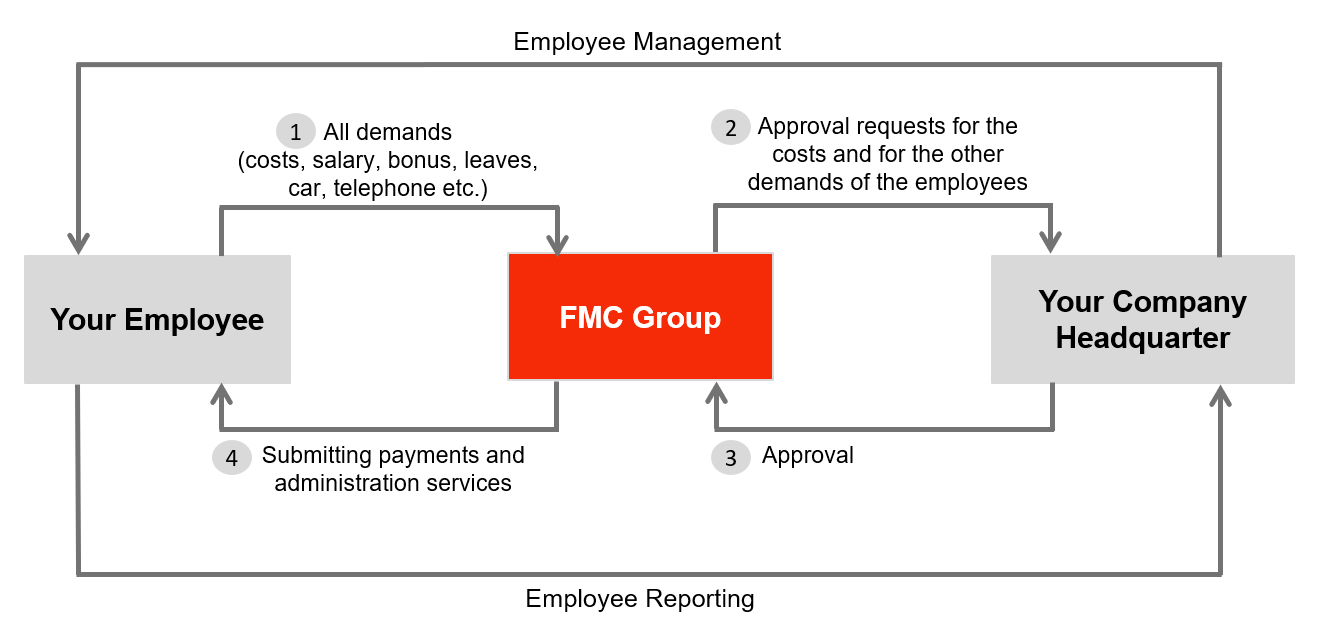
Employer of Record Spain
Our Employer of Record Spain service enables clients to hire employees without the need to operate a local legal entity there.
It makes a big difference to develop a new market with your own personnel on the ground. Particularly for functions related to sales & marketing, business development, distributor management, and service & maintenance, our customers are very satisfied using our Spain Employer of Record Service.
Our customers and their local teams can be free of the distractions of administrative tasks and complex local requirements. So you can fully focus on the development of your core business.
If your local business grows large enough, you can easily transfer the employees to your own subsidiary. It also provides a quick exit strategy if necessary. In addition to Spain, we offer Employer of Record services in several other countries.
Content:
- Employer of Record Spain – FMC Group’s Approach
- Hiring an Employee
- Income Tax
- Typical Benefits
- Visa for the Employees
- Time off Policies
- Terminating an Employee

Get in touch with us

Employer of Record Spain - FMC Group's Approach
- Quick, flexible, and easy entry into Spain in compliance with local employment laws
- Complete control over business development with your own team
- Good option for building up, managing, and supporting your distributors and key accounts by directly observing local developments and adjusting the strategy whenever necessary
- Using our comprehensive recruitment experience for international clients, we can form a local team that fits your corporate culture.
- Focusing on your core business instead of dealing with the time-consuming and complex local administrative tasks
- Allowing for easy market exit if necessary
- Integrating your employees into our team through motivational events and special meetings
EOR Spain Management & Reporting Flow

Hiring in Spain
Spain enforces strict employment regulations, categorizing jobs into various groups, each subject to its own set of rules governing salary ranges, working hours, and annual leave entitlements. Indefinite contracts are highly favored by employees because they provide greater job security and necessitate more generous compensation packages. Negotiating for an indefinite contract is often just as crucial as discussing salary terms for employees.
Given the stringent labor laws in place, it is a legal requirement in Spain to establish a comprehensive, written employment contract that outlines the employee’s compensation, benefits, and termination conditions. Additionally, it is imperative for employment contracts in Spain to specify salaries and any forms of compensation in euros rather than any foreign currency.
Employment Contract – indefinite vs. fixed term
In Spain, when hiring employees, you have the option to select between indefinite or fixed-term contracts. Nevertheless, recent regulatory changes have imposed strict limitations on fixed-term contracts, requiring a valid justification for their use.
As a result, many employees prefer indefinite contracts due to their typically enhanced job security and more attractive compensation packages.
Probation Period
In Spain, the duration of a probationary period is determined by the Collective Agreement specific to the job category. However, if there is no applicable Collective Agreement, the probationary period should not exceed:
- 6 months for undergraduate or junior college specialists.
- 2 months for all other employees.
Work Week, Overtime & Maximum Working Hours
In Spain, the standard workweek consists of 40 hours, with the majority of office employees typically working from Monday to Friday. Additionally, employees have the option to work up to 80 hours of overtime per year, with this limit excluding overtime compensated with rest time.
Income Tax
| Taxable Income | Tax Rate (%) |
| Up To €12450 | 19 |
| €12450-20200 | 24 |
| €202000-35200 | 30 |
| €35200-60000 | 37 |
| € 60,000 to 300,000 | 45 |
| € 300,000 and above | 47 |
Typical Benefits
- Health insurance in Spain is financed through social security taxes. Employers may offer supplementary health insurance as a benefit to their employees. Many executives often request additional health and life insurance coverage, and smaller companies may provide a financial allowance instead of arranging insurance.
- In 2021, Spain introduced a work-from-home allowance for all remote workers. The specific amount of this allowance is determined through mutual agreement between the employee and the employer or as specified in the relevant collective bargaining agreement.
- Employees in Spain are entitled to specific leave days, including 15 days (including weekends) for marriage, 2 days for the loss of a family member, and 1 day for home relocation.
Visa for the Employees
Obtaining a work permit in Spain is a time-consuming and highly scrutinized process. As a result, the country tends to prioritize hiring native citizens over foreign nationals. This preference stems from the restrictive policies of the Spanish government, which were implemented as a response to high unemployment rates within the country.
However, there are various types of working visas available, including the Highly Qualified Visa, Visa for Temporary Residency and Research Work, Intra-Company Transfer Visa, Self-Employed Work Visa, and Blue Card Work Permit.
Typically, the process for obtaining a work permit in Spain takes around 4 to 6 months, but it can occasionally extend up to 8 months. Once granted, the work permit is valid for 1 year, with the possibility of extending it for a maximum of 2 years.
Time off Policies
Public Holidays
In Spain, there are 10 national holidays
- New Year’s Day
- Three Kings Day
- Labor Day
- Good Friday
- Assumption Day
- National Day
- All Saints Day
- Constitution Day
- Immaculate Conception Day
- Christmas Day
Annual Leave
In Spain, employees typically enjoy 23 days of paid vacation leave per year, in addition to any public holidays.
Sick Leave
Spain does not have a set standard for sick days. According to Spain’s labor law, when an employee is temporarily unable to work due to illness or accident and requires medical attention, they are entitled to receive at least 60 percent of their regular wages.
Typically, the employer covers the payment for the employee during a temporary sick leave, and later, the Social Security department reimburses the employer. This arrangement can continue for a maximum period of 18 months, at which point the situation must be reassessed.
Other Leave Types
- Maternity Leave: In Spain, maternity leave encompasses a total of 16 weeks of paid leave, with a mandatory requirement of taking 6 weeks of leave following the birth of the child. To qualify for maternity leave, the mother must have previously registered with the social security office and contributed for at least 180 days in the preceding seven years or a cumulative total of 360 days throughout her career. Additionally, mothers have the option to take up to one year of unpaid maternity leave while legally retaining the right to return to their original role. An extension of two more years is possible, but there is no guarantee of resuming the same role after this period
- Paternity Leave: A significant change in the law in 2021 grants fathers the right to 16 weeks of paid paternity leave.
- Paid parental leave, whether for maternity or paternity, is funded by the government rather than the employer and is provided at 100 percent of the individual’s regular employed wage.
Terminating an Employee
In practice, when an employer determines that an employee is not a good fit for their role, it is common for both parties to reach a mutual agreement to terminate the employment contract.
There is a legally mandated notice period for employment contracts in Spain, with a maximum duration of three business weeks, equivalent to 15 working days. The notice period that an employee must provide to the employer cannot exceed this duration.
The anticipated cost of terminating an employee in Spain is typically budgeted as a severance payment for wrongful termination, which amounts to 33 days of salary per year of employment. Essentially, this translates to one month of salary for each year worked with the company. This calculation is based on the employee’s total gross income over the past 12 months.
Employees who believe they have been terminated unfairly have the right to contest their termination through a labor tribunal.
Disclaimer: Although we carefully researched and compiled the above information, we do not give any guarantee with respect to the actuality, correctness, and completeness.
